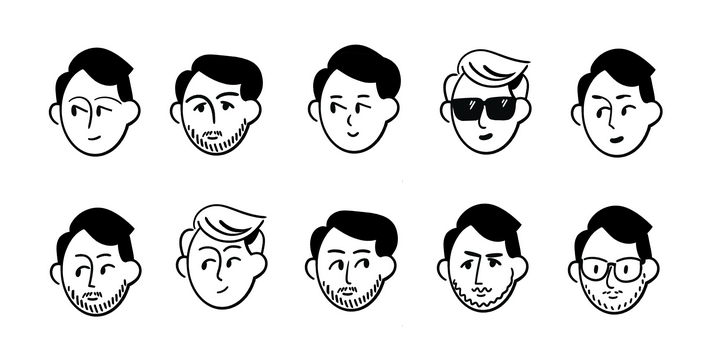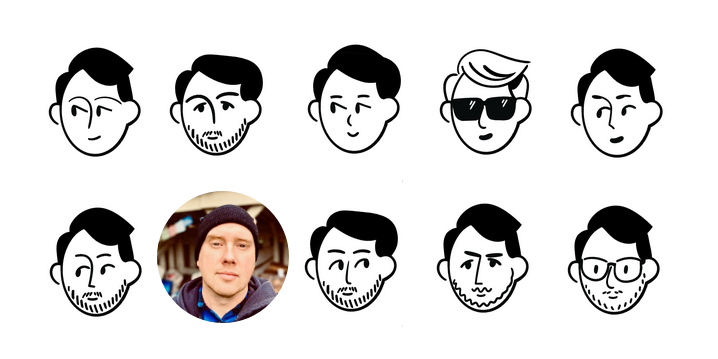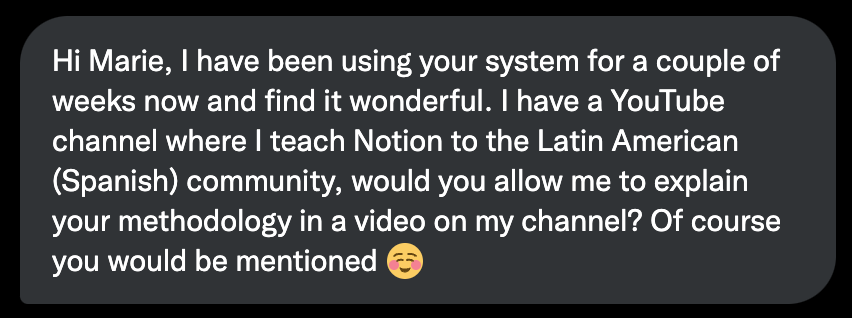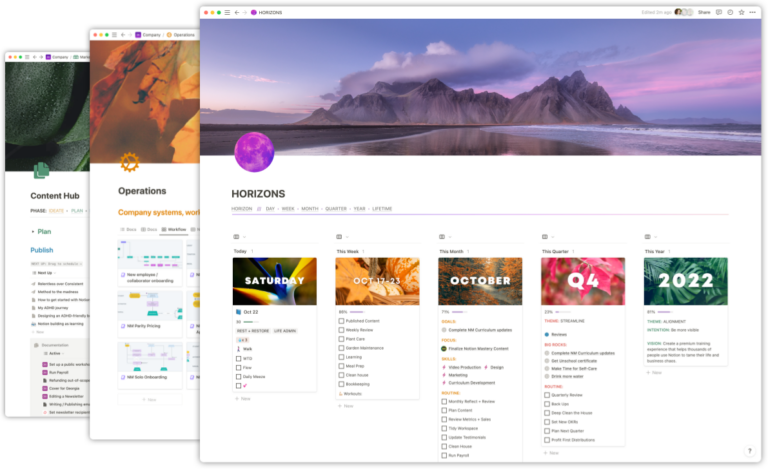The Notion creator economy is BOOMING.
Notion makes it pretty easy to design and ship templates-as-products. In the early *Notion days, there were only a handful of pioneers making amazing systems in Notion, but now that Notion’s been around for quite a few years, many more creators are getting in on the action.
It’s never been easier to create digital products online, and the friction to market is only going to be reduced in the next decade.
If you’re a *Notion creator, you may already be tired of seeing everyone shipping tracking templates, habit templates, social media templates, and more. Multiple marketplaces, loads of complete all-in-one OS-style templates (operating systems), content, courses—the sky’s the limit.
Notion seems to be everywhere.
And everyone wants to make that “template money” online. It seems so easy, right? “It’s just a template! I can do that!”
And so everyone is getting “Notion Certified” so that they can add that little extra bit of authority to their sales pages. Lots of folks get their egg icon and start sharing tweets about all the free tools they use to run their burgeoning Notion template business. Even Notion themselves gave us Notion-Certified Consultants our own eggs! Adorable! But… can you tell which one is me? What if there was 1,000 of these? How do you stand out?

A side-effect of this burgeoning market rife with financial opportunity is that we’re seeing many complaints of plagiarism and outright theft. It’s really, really easy to copy and paste a template, make tweaks, and re-package it as a “new” template.
A not so fancy topic in the "Notion market" … plagiarism and work ethic… 👀
— Alejandra Cienfuegos (@heyiamAC) October 21, 2022
One of the admins of the Notion sub-Reddit Alex Antoszek, suggests that, “many creators are engaging in questionable practices that include plagiarism, subvert promotion, buying fake engagement & more” and that the admins must “filter out a literal ton of shit every week.”
If you’ve explored the Notion Twitter group or the Notion Reddit yourself, you can probably relate:
The grift is real.
So what can we do about it?
With any rapidly growing tech with opportunity to make money, there’s going to be a fair amount of less-than-savoury behaviour. Creators who take their work seriously tend to worry about how the grifters make the collective look. In a similar manner as “web3” and “crypto” grifting, people might start to just tune out the Notion creator community as “all grift”.
As Notion creators, this can make us feel insecure. What can we do about this when it’s outside our control?
Thomas Frank, one of the world’s leading Notion creators states that, “people will inevitably lump you in and associate you with the more negative elements of your niche.”
And I definitely agree with him when he says, “if you’re not in the conversation, the grifters get to control [the narrative].” Further, Frank notes that, “if aspects of your message stand in opposition to the negative elements in your niche”, the people you probably really care about reaching will notice that.
💯 This is the key to combating the grift and separating signal from the noise: focus on creating content and products that represent how you want to be seen in the world.
Eyes on your own paper, so-to-speak.
In our case, this sometimes means less revenue. We take strong stands that our products and services aren’t for everyone. We don’t do paid ads or retargeting. Heck no to Facebook and TikTok. We avoid click-bait like the plague. We teach from a place of support and empathy, and that means being highly supportive and adaptive. It costs us a lot to be as vulnerable and open as we are online, but this is what sets us apart from the noise. It’s why we get known as the “ADHD-friendly” Notion course. The course that’s “more about life mastery than Notion mastery”.
Being more strategic about how you position yourself can help you stand out in a crowd.

On a similar note, Notion consultant Alex Sherwood notes, “if you have a depth of knowledge about a particular topic to accompany your templates and you create lots of content about that, then that will not only attract more of your audience, it will also set you apart as an expert in your field…the creators who are just here to get rich quick just employ growth hacks on social media and only have a superficial understanding of the processes that their templates are intended to help manage. So it’s not difficult to set yourself apart from them.”
This pairs nicely with Notion Mastery creator Marie Poulin’s vulnerability about her ADHD diagnosis. It’s actually marketing copy on our site:
I took a chance and moved everything over to Notion, and it was a complete game-changer. I was finally able to build a system that worked for my ADHD brain.
If we consider that multiple Notion creators could easily create the same project management template, why would a customer choose one over the other? People want to learn Notion from Marie because she’s focused on effectiveness over productivity; teaching people how to consider processes for managing their energy, review cycles, and so on. This means even basic Notion templates can be much more impactful, because the creator considers the user of the template and the context they are bringing to the table, more so than the template per se.
Credit and collaboration
Another thing we can do is set ourselves up to collaborate with other community members. Many prominent template creators see their work directly reproduced or even copied. Many creators don’t mind at all seeing similar design styles utilized from their templates (they are templates after all), but when entire systems are copied with no credit to original sources, it can frustrate other creators.
Marie tells me she doesn’t mind at all when she sees student dashboards that look similar to the ones we help students learn how to create in the course. In fact, we once had a person reach out and accuse Marie of stealing one of our student’s templates, when the template this person was selling was in fact a derivation of Marie’s work! Marie is delighted to see her teachings out in the wild.
If you build a project that leans heavily on a prominent creator’s instruction or prior work, crediting them in the template and sharing how you were inspired might even help you build a relationship with the creator, because many creators are more interested in systems thinking and ideas than template execution.
What if you thought of your competitors as collaborators instead? What might you accomplish together?
A great example of this:
Maxi Hawk reached out to Marie directly on Twitter with an ask:

Marie was delighted to know that her work has such impact that others are interesting in sharing it, and share how they’re adapting it to their own needs + preferences. A few weeks later, Max shared his video with Marie, and she retweeted it for more visibility. It was a win-win!
What can Notion do to help the community?
As the community continues to grow rapidly, it may become increasingly difficult to influence the creator economy.
What could Notion themselves possibly do to help combat grift and theft in the ecosystem?
The Notion Ambassadors, many of which are top-template-creators themselves, have been campaigning for more controls in how templates are controlled and distributed.
Some of the topics of discussion include:
- Payments
- Gating templates behind paywalls.
- Gating templates behind crypto (hard no for me, but it’s been discussed).
- Analytics for template-creators so they can see who installed a template and where.
- Better attribution so that if templates are duplicated and redistributed we can easily see who the originating creator was.
- My personal suggestion: open up more API endpoints to the public so that we have deeper access to functionality like duplication of pages and access control. This way we can build out own marketplaces and protection solutions.
I can’t discuss specifics of the conversations here, but Notion has definitely shown interest in adding protections for creators, so that’s promising.
As the ecosystem continues to scale, we (the collective we) hope to grow along with Notion’s offering as a community and foster the rich, rewarding, and collaborative community we all know can be possible.
Until then, eyes on your own paper! How do you stand out?
[*For full disclosure, I’m a Notion Partner, so when you sign up with my link, you also help support me and my content!]

 Notion tips in your inbox
Notion tips in your inbox